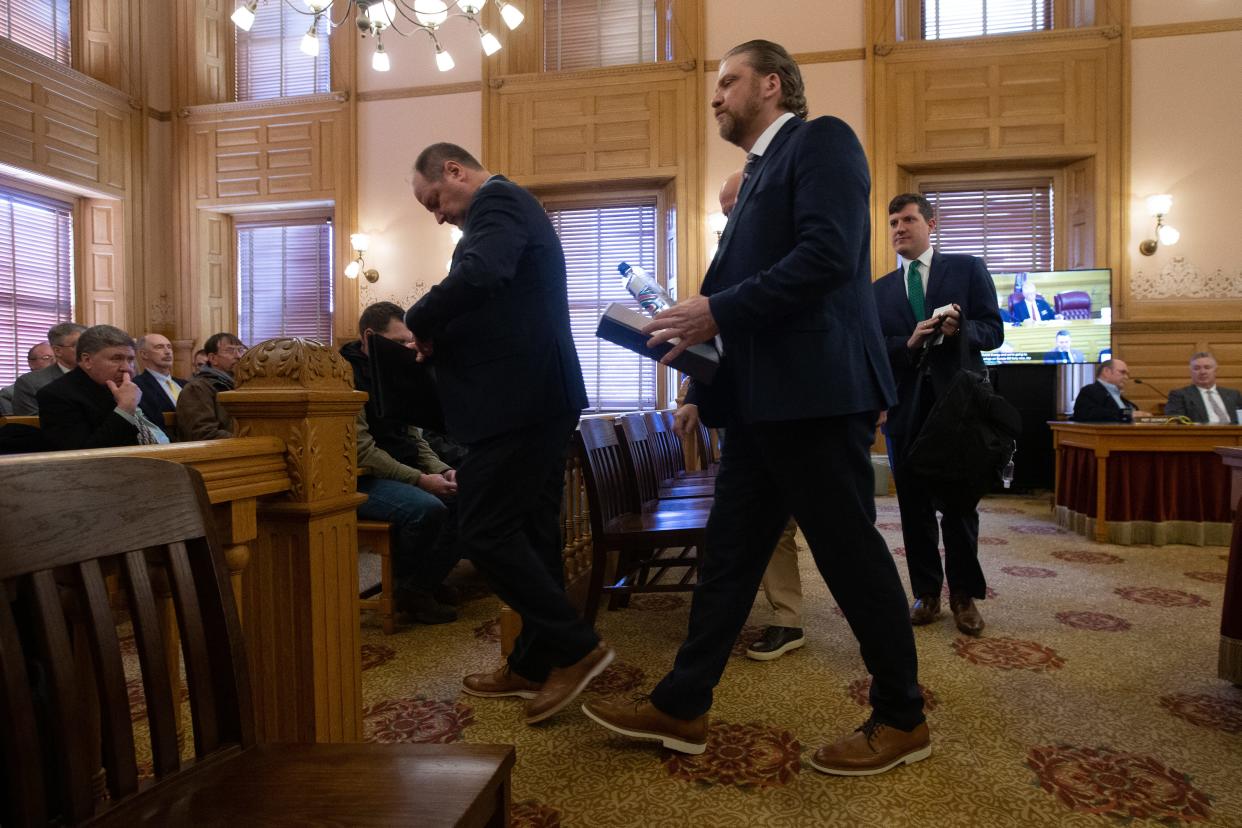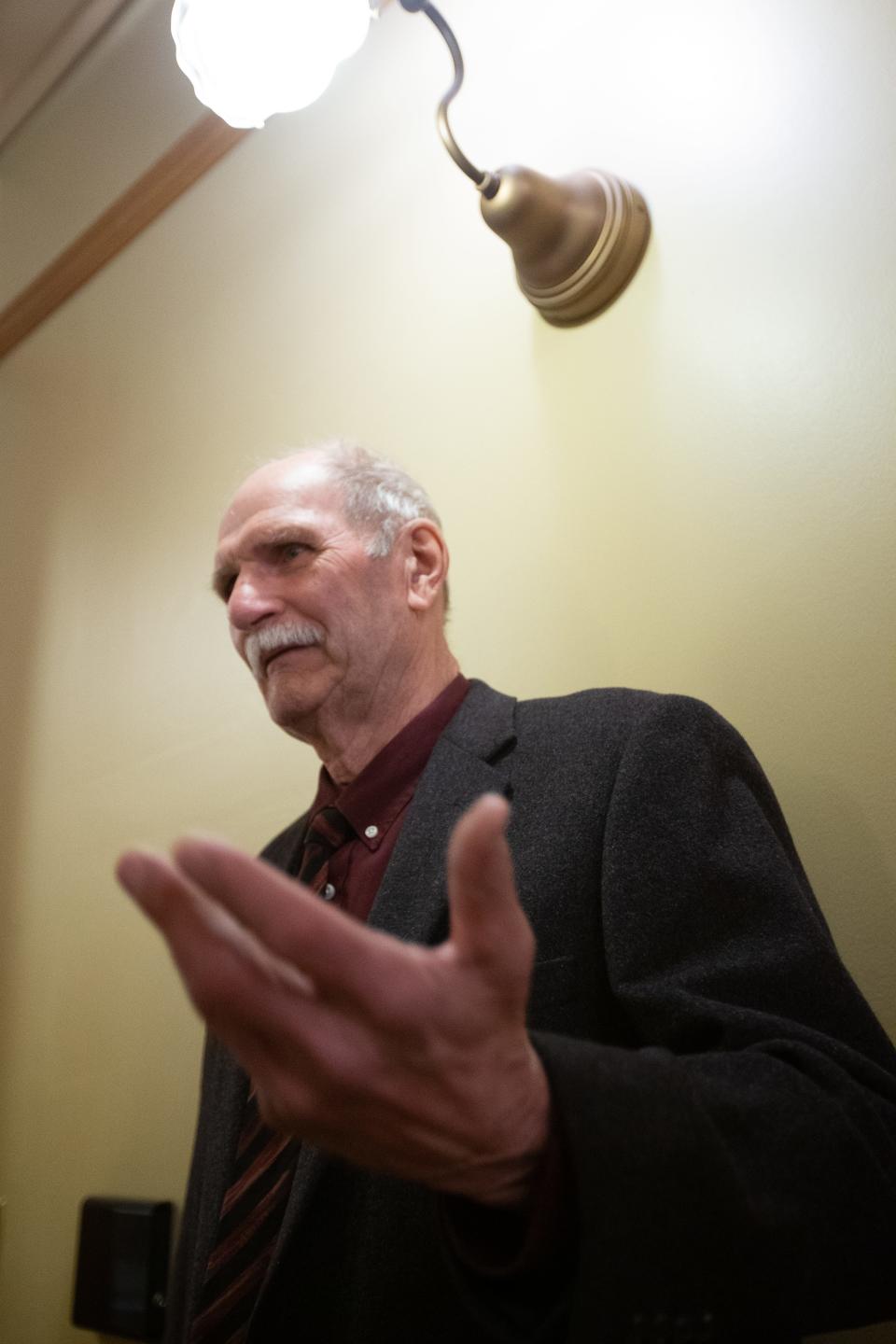Keystone pipeline operator grilled on Kansas oil spill. Cleanup timeframe is uncertain.

The operator of the Keystone Pipeline said cleanup efforts of a north-central Kansas oil spill will continue to stretch on for at least the next several months but declined to provide a firmer timeframe to legislators Tuesday, the first time TC Energy has publicly answered questions on the incident.
Lawmakers grilled the company over their handling of the December spill, when 12,000 barrels of crude oil flowed from the Keystone pipeline into Mill Creek near Washington, representing the largest onshore oil spill since 2014.
TC Energy reopened the affected portion of the pipeline in late December after approval from the federal government, though key details, such as preliminary findings on the cause of the spill did not emerge until much later.
The hearing comes days after the Pipeline and Hazardous Materials Safety Administration ordered TC Energy to reduce the pressure used for the Keystone Pipeline. This effectively revokes a waiver the company received six years ago that allowed them to move oil through the pipeline at a higher pressure than is normally permitted.
More:Pipeline operator discloses cause of Kansas Keystone oil spill. EPA chief pledges oversight

Gary Salsman, TC Energy's vice president of field operations, said the company had already voluntarily complied with the terms of the order and was committed to fully cleaning up the spill — which the company estimates will cost $480 million — and not just staying for the short term.
"We want to be a part of these communities," Salsman told a joint meeting of the House Energy and Water committees. "We will be here until we fully remediate this issue and we hope there won’t be any follow up after that."
Salsman's testimony was met with some skepticism. While many lawmakers and environmental groups said they were glad that TC Energy was publicly answering questions, they noted they were not satisfied with the company's response, saying it relied too heavily on talking points rather than substance.
"I do appreciate TC Energy’s willingness to speak to the committee," said Rep. Lindsay Vaughn, D-Overland Park. "But I do feel like a lot of the answers to my questions were evasive and we are still hearing from TC Energy what TC Energy wants to hear."
More:Pipeline operator discloses cause of Kansas Keystone oil spill. EPA chief pledges oversight
Lawmakers press TC Energy on pipeline welds
TC Energy disclosed initial findings about the cause of the spill last month, pinning the spill's cause on a "combination of factors" but pointed specifically to a flaw in the pipe's welding that combined with bending stress to produce what Salsman described as an "instantaneous rupture."
The company said that welding inspection and testing "were conducted within applicable codes and standards." Moreover, Salsman said Tuesday that the company was undertaking a review of welds across the entire pipeline, which runs from Alberta to Texas, with a branch that juts into Illinois.
A third-party analysis of what went wrong is ongoing and is expected in the weeks to come, Salsman noted.

"No incident is acceptable to us and we want to be sure that nothing like this happens again," he said.
But when asked how many similar welds might exist across the pipeline system, Salsman demurred.
"I don't have that particular information on hand. ... It would not be a huge number," he said.
Rep. Leo Delperdang, R-Wichita, chair of the House Energy, Utilities and Telecommunications Committee, said he was concerned about the potential for further welding issues across the pipeline, with the Keystone continuing across south-central Kansas to Cushing, Oklahoma.
"I'm not going to say I'm not convinced, but I'd like to know what a very few (welds) means," Delperdang told reporters. "Is that one or two or is that a couple hundred in the scheme of things? I don't know what the meaning of that is."

Lawmakers said they were particularly concerned about this given an increase in seismic activity in south-central Kansas, near Wichita. That area has seen 37 measurable earthquakes in the past 365 days, Kansas Geological Survey data shows, though Salsman said such events are taken into account when engineering a pipeline project.
"When that pipeline was built in 2011, they didn't have that kind of seismic activity," said Rep. Jerry Stogsdill, D-Prairie Village. "If I lived around the Wichita area there, I'd be very concerned about that question."
Vaughn pointed to a 2021 General Accounting Office report that shows spills on the pipeline have become more frequent in recent years. The PHMSA order also said at least three incidents since 2009 have occurred because of girth welding failures.
"They are not clear about what is causing the increased severity and frequency of these spills," Vaughn said.
More:Company restarts Keystone portion affected by Kansas oil spill. The cause remains unknown.
Other lawmakers praised TC Energy for their response. In the Senate Utilities Committee, Salsman received a much warmer reception.
"Accidents do happen and I know you're prepared for this kind of stuff, the business you're in," Sen. Rob Olson, R-Olathe, the committee's chair, said. "As a Kansan, as a taxpayer, thanks for getting on site, getting it taken care of. We can talk about what happened later."
Company hopeful major spill cleanup to be completed in two months
TC Energy has currently cleaned up 95% of the oil, the company said, and said its "major" cleanup efforts would be completed in the next several months, with an additional few months of cleanup expected to follow.
But when asked by Rep. John Carmichael, D-Wichita, whether the entire effort would be finished in the next six months, Salsman said, "That's not within our control."
"The answer is you don’t know," Carmichael shot back.
The company has for months been diverting Mill Creek, a process they called "dewatering," so they could excavate the oil contaminated soil in the creek bed.
The water, meanwhile, is diverted to a second pond where it is passed through a water filtration system and tested to be sure it is within Kansas Department of Health and Environment and Environmental Protection Agency guidelines.
TC Energy has not made air or water test results public, though it has said it is conducting "continuous monitoring" and that all tests have been within the requisite standards.
KDHE, however, did say that some chemicals were found downstream of the dam in the weeks following the spill. The agency has not yet made test results from December available to The Topeka Capital-Journal under the Kansas Open Records Act.

Bill Pannbacker, a former state legislator whose pasture sat about 12 feet from the pipeline rupture in Washington County, said he didn't believe the company misrepresented the truth during their presentation and that he had been compensated fairly.
But a burn ban implemented in response to the spill has limited his ability to conduct controlled burns on his property. And the affected pasture, which spans 60 to 80 acres, likely won't be useable for as many as five years.
"I haven't quite figured out how we're going to modify our grazing patterns," he said.
Zach Pistora, a lobbyist for the Kansas chapter of the Sierra Club, said the company should be publicly disclosing information on environmental impacts and questioned the viability of pipeline projects if they could not perform safely.
Salsman and company staff didn't respond to questions from reporters following the meeting. The company said in an email that "our primary focus continues to be on recovering and fully remediating the Milepost 14 incident site" but did not say when news media might be able to visit the spill site.
"I think they were interested in telling a story that they want to tell and there are some questions outstanding that were navigated to not answer today," Pistora said. 'Hopefully, this committee will stay on it to answer those questions in the future."
This article originally appeared on Topeka Capital-Journal: Keystone pipeline operator TC Energy grilled on Kansas oil spill

